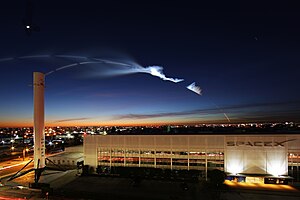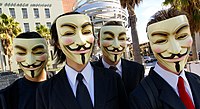Google Search
Anonymous
SpaceX Launch
SpaceX Launch
Space Exploration Technologies Corp., trading as SpaceX, is a private American aerospace manufacturer and space transportation services company headquartered in Hawthorne, California. It was founded in 2002 by Elon Musk with the goal of reducing space transportation costs to enable the colonization of Mars.[7][8][9] SpaceX has developed several launch vehicles and the Dragon spacecraft.
 SpaceX Headquarters during Iridium-4 launch operations, December 2017 | |
| SpaceX | |
| Private | |
| Industry | Aerospace |
| Founded | May 6, 2002; 18 years ago[1] |
| Founder | Elon Musk |
| Headquarters | |
Key people |
|
| Products | |
| Services | Orbital rocket launch |
| Owner | Elon Musk Trust (54% equity; 78% voting control)[2] |
Number of employees | 8,000 (November 2019) |
| Website | www |
| Footnotes / references [3][4][5][6] | |
SpaceX's achievements include the first privately funded liquid-propellant rocket to reach orbit (Falcon 1 in 2008),[10] the first private company to successfully launch, orbit, and recover a spacecraft (Dragon in 2010), the first private company to send a spacecraft to the International Space Station (Dragon in 2012),[11] the first propulsive landing for an orbital rocket (Falcon 9 in 2015), the first reuse of an orbital rocket (Falcon 9 in 2017), and the first private company to launch an object into orbit around the sun (Falcon Heavy's payload of a Tesla Roadster in 2018). SpaceX has flown 20[12] resupply missions to the International Space Station (ISS) under a partnership with NASA.[13] NASA also awarded SpaceX a further development contract in 2011 to develop and demonstrate a human-rated Dragon, which would be used to transport astronauts to the ISS and return them safely to Earth.[14][self-published source?] SpaceX conducted the maiden launch of its Dragon 2 spacecraft on a NASA-required demonstration flight (Crew Dragon Demo-1) on March 2, 2019 and is set to launch its first crewed Dragon 2 on May 27, 2020.[15]
In December 2015, a Falcon 9 accomplished a propulsive vertical landing. This was the first such achievement by a rocket for orbital spaceflight.[16] In April 2016, with the launch of CRS-8, SpaceX successfully vertically landed the first stage on an ocean drone ship landing platform.[17] In May 2016, in another first, SpaceX again landed the first stage, but during a significantly more energetic geostationary transfer orbit mission.[18] In March 2017, SpaceX became the first to successfully re-launch and land the first stage of an orbital rocket.[19] In January 2020, with the third launch of the Starlink project, SpaceX became the largest commercial satellite constellation operator in the world.[20][21]
In September 2016, CEO Elon Musk unveiled the Interplanetary Transport System, a privately funded launch system to develop spaceflight technology for use in crewed interplanetary spaceflight. In 2018, Musk unveiled an updated configuration of the system, named Starship, which is intended to become the primary SpaceX orbital vehicle after the early 2020s, as SpaceX has announced it intends to eventually replace its existing Falcon 9 launch vehicle and Dragon 2 fleet with Starship, even in the Earth-orbit satellite delivery market.[22][23][24]:24:50–27:05 Starship is planned to be fully reusable and will be the largest rocket ever on its debut, scheduled for the early 2020s.[25][26]
Resurge - The Godzilla Of Offers
Resurge - The Godzilla Of Offers https://4f9e35yal7ymxwafmo-oh8dycy.hop.clickbank.net/

https:// impulsionvie.blogspot.com/2020/05/midnight-sun.html?m=1
-
Olympique de Marseille club de football français Olympique de Marseille Généralités Nom complet Olympique de Marse...
-
New Battery Reconditioning Course! Vsl Conversions 9.7% & Epc $2.1! (voir Mobile) https://9e7a49oftknew-bb99hf2d4s0l.hop.clickban...


